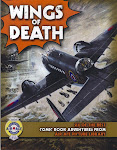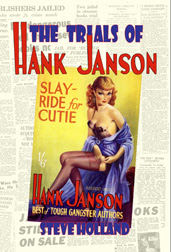The series stood out because each brief episode was rebroadcast in part; as the storyline was repeated, a voice would call 'Stop' to indicate that the vital clue had been reached.
Soon after, the Inspector became the star of his first book. "Inspector Hornleigh's activities on the air have made millions of listeners regard him almost as a real person. In book form, however, the plot that Inspector Hornleigh Investigates is too machine-made to keep up the illusion. The criminals led by the mysterious "Boss"; the secret passage between adjoining flats; the scientific invention, potent for good or ill; the foolhardy heroine—these are stock ingredients, and it says much for Mr. H. W. Priwin's skill that he has managed to make the mixture sufficiently exciting to carry the reader along." (The Times, 2 January 1940)
Hornleigh was already a star of stage and screen. A review of Inspector Hornleigh Investigates appeared in the Guardian on 17 May 1938:
The Observer for 30 October 1938 noted that Twentieth Century-Fox were shooting a movie based on the character at Pinewood studios. "Gordon Harker is to play Hornleigh, and Alistair Sim his assistant, Sergeant Bingham. Eugene Forde, director of three Charlie Chan pictures and associated with eight others, has been brought over from America to direct the film."
There were three Hornleigh pictures in all: Inspector Hornleigh (1939), Inspector Hornleigh on Holiday (1939) and Inspector Hornleigh Goes To It (1941), the latter released in the US as Mail Train.
The films starred Gordon Harker (1885-1967), whose stage career dated back to 1903. Described by Brian McFarlane (Encyclopedia of British Film) as "Lugubrious, shifty, aggressive, occasionally chirpy, Cockney Gordon Harker ... was a cherished fixture in British films for 30 years." He was a regular in British thrillers in the 1930s, including many Edgar Wallace adaptations: The Wrecker, The Squeaker, The Ringer, The Calendar, The Frightened Lady and White Face. He played Sergeant Elk to Jack Hawkins's Captain Gordon in The Frog (1937) and was promoted to the lead, now Inspector Elk, in the sequel Return of the Frog (1938, aka Nobody Home), shortly before taking the lead in the Inspector Hornleigh movies.
His overconfident, fallible but human Hornleigh was accompanied in his adventures by bumbling Sergeant, played by Alistair Sim. The films were surprisingly well reviewed for a series in what was a fairly common genre at that time. The debut film involved an investigation into a murder at a lodging house, during which a plot is uncovered to steal the budget from the Chancellor of the Exchequer before it can be announced. In the second movie, Hornleigh is convinced that a seeming accident is actually a murder. In the third film, Hornleigh is determined to root out fifth columnists but, instead, is assigned to a case of petty pilfering at an army base... only for Hornleigh to stumble upon the spy network.
Harker continued to play leading roles in thrillers such as Once a Crook (1941), Warn That Man (1943) and The Second Mate (1950), as well as comedies such as Things Happen at Night (1947) as well as playing Dr. Doolittle in a TV adaptation of Pygmalion (1948)
Hornleigh's creator was a German Jew, Hans Wolfgang Priwin, who had worked as a radio broadcaster and journalist for many years in Germany.
In 1933, The Evening Independent described how Priwin was to broadcast to stations in the USA on 1 April 1933:
A German Jew living in Berlin will describe present conditions in Germany, especially as they affect the Jewish portion of the population, in an international broadcast to the United States through National Broadcasting company networks tonight.
The speaker will be Hans W. Priwin, a member of the executive committee of the Association of German National Jews. His address, which will be broadcast over an NBC-WEAF network at 7 o'clock, will come from the studios of the Reichs Rundfunk Gesellschaft in Berlin. It will not be broadcast in Germany.
Priwin is a radio commentator of wide reputation, and director of a Berlin news agency. He is a member of a Jewish family which has lived in Germany for several centuries.
The New York Times carried the full text of Priwin's speech:
James G. McDonald mentions in his diaries (Advocate for the Doomed: The Diaries and Papers of James G. McDonald, 1932-1935, p.36) on 3 April 1933:
Returned to the hotel to have a second tea with Hans W. Priwin, radio newspaper man. Being a Jew, he had lost all right to work with the German Broadcasting Company and German papers. His tale is just one more.By 1936, Priwin was living in Hampstead, London, at 19 Belsize Crescent (fl.1936), 36 Tudor Close, Belsize Avenue (fl.1936-39) and 84 Hillfield Court, Belsize Avenue (fl.1941). In his early career in radio, he wrote a weekly problem 'What Do You Think?' for Band Waggon.
Hans Wolfgang Priwin of 6 Court Terrace, Rogers Lane, Stoke Poges (fl.1946-47), became a British Citizen on 15 July 1947. By then he was using the name John Peter Priwin and, on 12 January 1948, changed his name by deed poll to John Peter Wynn, giving his address as "Winsden", Elm Close, Farnham Common (fl.1948-49).
This change of name was reflected in the 1949 telephone book, where J. P. Wynn takes over the house in Farnham Common in 1949. He was married Joan Clark in London in 1953 and subsequently moved to 13 Dorset Street, London W.1 (fl.1952-60) and 37 Dollis Avenue, Finchley N.3 (fl.1961-69).
As J. P. Wynn, he wrote a series of detective tales featuring Francis De Wolff as Gordon Grantley K.C., who debuted on the Light Programme as 10:15 pm on Friday, 20 August 1948. (Kenneth Williams made his radio debut in two episodes of the series.)
In 1955, John P. Wynn was credited as the author of What Do You Know?, 1,000 general knowledge questions (along with their answers) "by the organizer of the famous B.B.C. Programme of the same name".
What Do You Know? was broadcast on the Light Programme from 1953, the original show a portmanteau of different games, including 'Beat the Experts', in which experts tried to spot deliberate errors in a sketch written about their specialised subject, and 'Ask Me Another', which involved celebrities of the day and the public answering questions. The celebrity contestants were dropped by 1956 and this section became a quiz for the public who battled to become the Brain of Britain, while 'Beat the Expert' became 'Beat the Brains', with the public trying to stump experts with questions. The show folded in 1967 and was relaunched in 1968 as Brain of Britain, with the main quiz element dominating.
Wynn is credited as having set the questions for the show with his producer Joan Clark. In an obituary for "Mycroft" (Ian Gillies), who subsequently set the questions, it was noted that "In 1972 the original Brain of Britain question master Franklin Engelmann died midway through the series and Gillies, as the reigning Top Brain, stepped in to host the remaining programmes. John P. Wynn ... died around this time, and Gillies was asked to stay on to help Clark with the question-setting."
According to his entry in the Dictionary of National Biography, Gillies gave up his job in advertising in 1971 as he was "by this stage writing most, if not all, of the questions for Brain of Britain". Wynn had not died but had retired to Ireland with his wife, Joan.
He died at his home at Winsliabh, Skibereen, Ireland, on 20 April 1978, survived by his wife and daughter, Mona.
Publications as Hans W. Priwin
Kurzwellen-Verkehr. Berlin, Rothgiesser & Diesing, 1928.
Novels as H. W. Priwin
Inspector Hornleigh Investigates. London, Hodder & Stoughton, 1939.
Non-fiction as John P. Wynn
What Do You Know? A thousand general knowledge questions and answers. London, G. Bell & Sons, 1955.
Ask Me Another. Seven hundred and fifty general knowledge questions and answers. London, G. Bell & Sons, 1960.
Brain of Britain. A quiz book from the BBC radio programme. London, British Broadcasting Company, 1972.
(* Photograph of the cast of What Do You Know? from the Radio Days website here.)
























































No comments:
Post a Comment